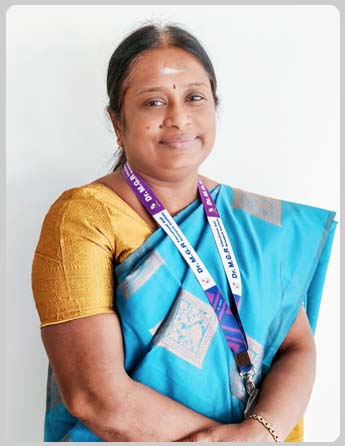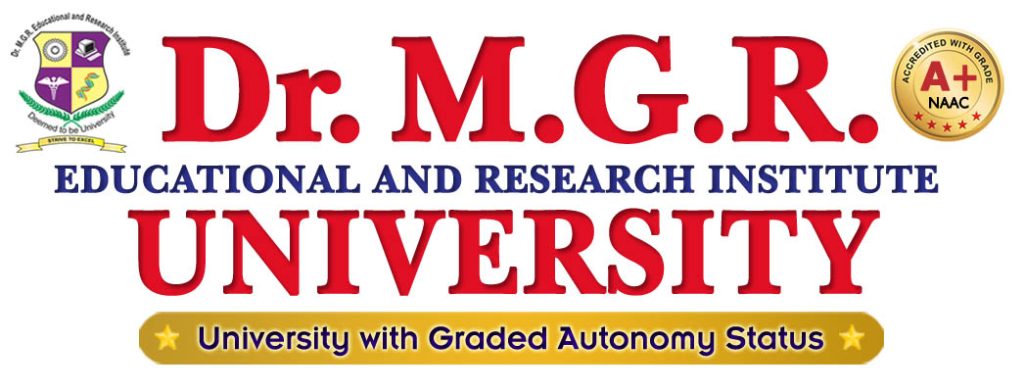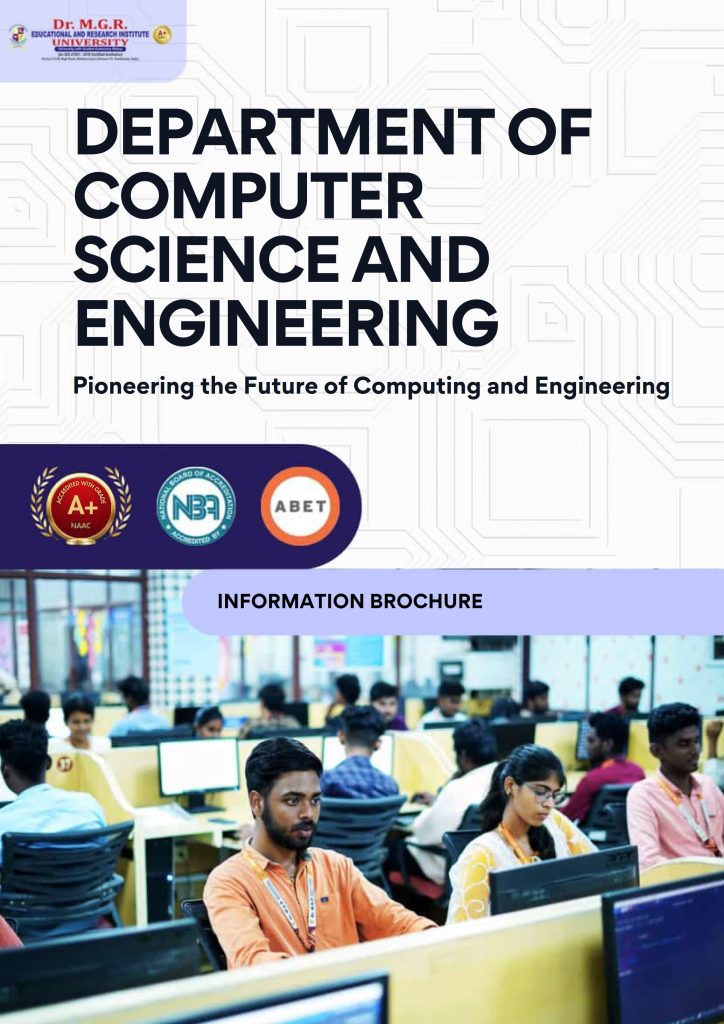
Faculty of
Engineering
32+
180+
50+
40+
Faculty Members
Students Placed
Tier 1 Placed
Student Aboard
About the Department
The Department of Computer Science and Engineering was started in the year 1988, aims to impart high quality education to post-graduate and under-graduate students as well as to carry out cutting edge technology research on various disciplines of Computer Science and Engineering.
The Department is agile, well organized and aligning itself to impart the knowledge needs of current Industrial requirements.
The Programs Offered by the department are
- B.Tech. Computer Science and Engineering
- M.Tech. Computer Science and Engineering
- M.Tech. Cyber Forensics and Information Security
The curriculum of programmes has been designed to cater to the ever changing needs and demands of Industry.
Head of the Department,
Department of CSE,
Dr.M.G.R. Educational and Research Institute,
Maduravoyal
Chennai – 600095
Please feel enquiry call us.
Our Social Media Links

Accreditation
The B.Tech program in Computer Science and Engineering is accredited by the Engineering Accreditation Commission of ABET, https://www.abet.org under the general criteria and Program Criteria for Electrical, Computer, Communications, Telecommunication(s), and Similarly Named Engineering Programs. (more details)
The B.Tech program in Computer Science and Engineering is accredited by the Computing Accreditation Commission of ABET, https://www.abet.org under the general criteria and Program Criteria for Electrical, Computer, Communications, Telecommunication(s), and Similarly Named Engineering Programs. (more details)
B.Tech. CSE programme is accredited by NBA (National Board of Accreditation). (more details)
A team of well trained teaching faculties are dedicated to focus on preparing the students for wide range of IT careers in reputed companies and equipping them for Research with unique experience thus molding tomorrow’s technocrats with high caliber.
The Department provides skill based training to the students in association with CISCO, REDHAT, IBM, ORACLE and Spoken tutorial IIT Bombay and the list is expanding or limiting depending upon the current trends and Industrial quest. Special activities designed to enhance and empower the student’s skills are periodically conducted within the campus. The department is successfully collaborating with various IT companies for hands on Training and Internship for the students during their course period.
Up to date by technology and aesthetically pleasing infrastructure and labs are available in the department to impart high quality education with high standards par excellence in Engineering and Technology with the motivation of mitigating cross cultural and cross regional boundary concern of students.
The department has signed MOUs with foreign universities for Students Exchange Programmes.
Vision
To be a Center of Excellence in Computer Science and Engineering that would develop self-sustaining and globally competent Computer Science professionals
Mission
- M1 : Enable students with the state of art technologies and knowledge emerging in the domain of Computer Science and Engineering.
- M2 : Motivate the students to comprehend problems across Inter Disciplinary domains and offer innovative solutions
- M3 : Share and collaborate knowledge across the IT Industries for holistic development of skilled and talented students.
- M4 : Impart the students with Ethical values in engineering practice and human values to make them as good citizens.
Quality Policy
Aimed to provide globally accepted quality in design and effective implementation of Computer Science and Engineering based education and research by having well defined processes and through continuous improvement in Academic/ Administrative Activities.
National Board of Accreditation (NBA)
Program Educational Objectives (PEO)
- PEO1 : Establish a career in professional software development for Government and private sectors and engage themselves in a Professional, Ethical and Responsible manner
- PEO2 :Successfully pursue Higher Studies in the field of Computing Paradigms, Computer Engineering and Management.
- PEO3 : Cope up with the latest technologies and provide adequate training and involve in the implementation of software products and services based on dynamic requirements of industries.
Program Specific Outcomes (PSO)
- PSO1 : To apply the knowledge and professional skill of theoretical Computer science to provide ethical solutions for real world problems
- PSO2 : To comprehend highly complex engineering problems with the knowledge of basic science and engineering
- PSO3 : To design economic, innovative hardware and software system for various domains.
- PSO4 : To create platforms for secured information sharing and management for engineering or social applications
Program Outcomes (PO)
- PO1: Engineering knowledge: Apply the knowledge of mathematics, science, engineering fundamentals, and an engineering specialization to the solution of complex engineering problems.
- PO2: Problem analysis: Identify, formulate, review research literature, and analyze complex engineering problems reaching substantiated conclusions using first principles of mathematics, natural sciences, and engineering sciences.
- PO3: Design/development of solutions: Design solutions for complex engineering problems and design system components or processes that meet the specified needs with appropriate consideration for the public health and safety, and the cultural, societal, and environmental considerations.
- PO4: Conduct investigations of complex problems: Use research-based knowledge and research methods including design of experiments, analysis and interpretation of data, and synthesis of the information to provide valid conclusions.
- PO5: Modern tool usage: Create, select, and apply appropriate techniques, resources, and modern engineering and IT tools including prediction and modeling to complex engineering activities with an understanding of the limitations.
- PO6: The engineer and society: Apply reasoning informed by the contextual knowledge to assess societal, health, safety, legal and cultural issues and the consequent responsibilities relevant to the professional engineering practice.
- PO7: Environment and sustainability: Understand the impact of the professional engineering solutions in societal and environmental contexts, and demonstrate the knowledge of, and need for sustainable development.
- PO8: Ethics: Apply ethical principles and commit to professional ethics and responsibilities and norms of the engineering practice.
- PO9: Individual and team work: Function effectively as an individual, and as a member or leader in diverse teams, and in multidisciplinary settings.
- PO10: Communication: Communicate effectively on complex engineering activities with the engineering community and with society at large, such as, being able to comprehend and write effective reports and design documentation, make effective presentations, and give and receive clear instructions.
- PO11: Project management and finance: Demonstrate knowledge and understanding of the engineering and management principles and apply these to one's own work, as a member and leader in a team, to manage projects and in multidisciplinary environments.
- PO12: Life-long learning: Recognize the need for, and have the preparation and ability to engage in independent and life-long learning in the broadest context of technological change.
Accreditation Board for Engineering and Technology
Program Educational Objectives (PEO)
- PEO1 : Establish a career in professional software development for Government and private sectors and engage themselves in a Professional, Ethical and Responsible manner
- PEO2 :Successfully pursue Higher Studies in the field of Computing Paradigms, Computer Engineering and Management.
- PEO3 : Cope up with the latest technologies and provide adequate training and involve in the implementation of software products and services based on dynamic requirements of industries.
Student Outcomes - CAC
- Analyze a complex computing problem and to apply principles of computing and other relevant disciplines to identify solutions.
- Design, implement, and evaluate a computing-based solution to meet a given set of computing requirements in the context of the program's discipline.
- Communicate effectively in a variety of professional contexts.
- Recognize professional responsibilities and make informed judgments in computing practice based on legal and ethical principles.
- Function effectively as a member or leader of a team engaged in activities appropriate to the program's discipline.
- Apply computer science theory and software development fundamentals to produce computing-based solutions.
Student Outcomes - EAC
- An ability to identify, formulate, and solve complex engineering problems by applying principles of engineering, science, and mathematics.
- An ability to apply engineering design to produce solutions that meet specified needs with consideration of public health, safety, and welfare, as well as global, cultural, social, environmental, and economic factors.
- An ability to communicate effectively with a range of audiences.
- An ability to recognize ethical and professional responsibilities in engineering situations and make informed judgments, which must consider the impact of engineering solutions in global, economic, environmental, and societal contexts.
- An ability to function effectively on a team whose members together provide leadership, create a collaborative and inclusive environment, establish goals, plan tasks, and meet objectives.
- An ability to develop and conduct appropriate experimentation, analyze and interpret data, and use engineering judgment to draw conclusions.
- An ability to acquire and apply new knowledge as needed, using appropriate learning strategies.

Dr. S. Geetha
M.E, Ph.D
HoD's Desk
A Message
Warm Greetings!!!
As the Head of the Department, I am privileged to lead a team of exceptional faculty, staff and students who are passionate about pushing the boundaries of Computer Science and Engineering.
At our department, we are committed to provide a vibrant and simulating learning environment that nurtures the next generation of technology leaders. Our curriculum is designed to equip student with a strong foundation in Computer Science principles, along with practical hands-on experience to tackle real-world challenges. Through our rigorous academic programs, students gain a deep understanding of the latest advancements in areas such as Artificial Intelligence, Data Science, Cyber Security, Software Engineering, Cloud Computing and more.
Beyond the classroom, we encourage our students to engage in hands-on learning experiences through research projects, internships and industry collaborations. These opportunities allow them to apply their knowledge to real-world problems, gain valuable industry exposure, and develop the skills necessary to become leaders in their chosen fields.
Research is the heart of our department, and we encourage our faculty and students to explore new frontiers in technology. Our accomplished researchers are actively engaged in a wide range of interdisciplinary projects, collaborating with industry partners, and contributing to significant breakthroughs that impact society.
We believe in the power of collaboration and community. Our department provides a supportive and inclusive environment that fosters teamwork, interdisciplinary collaborations, and intellectual growth. Through various student organizations, workshops, seminars and guest lectures, we strive to create a platform for networking, knowledge sharing, and lifelong learning.
We take immense pride in the accomplishments of our alumni, who have made significant contributions in academia, industry and entrepreneurship. Their success stories serve as a testament to the quality education and strong foundation provided by our department.
Whether you are a prospective student, industry partner or fellow researcher, we welcome you to join us in shaping the future of Computer Science and Engineering.
Thank you for visiting us and I look forward to welcoming you to our vibrant and dynamic department.
Research & Development
The core idea of research in Computer Science and Engineering is to impart advance knowledge and understanding of existing computing systems, algorithms, and technologies. Computer Science research aims to solve complex problems which may involve interdisciplinary cross cutting concerns and aims to develop innovative software or embedded system solutions that may be acclaimed by the society and co-research communities. In doing so the department fulfills the ever changing human and industrial technological needs.
Thrust Areas Of Research
- Artificial Intelligence & Machine Learning (AI & ML)
- Data Science & Big Data Analytics
- Image Processing & Computer Vision
- IoT & Human-Computer Interaction (HCI)
- Cryptography & Security
- Algorithms and Complexity Theory
- Computer Graphics and Visualization
Placed
Compaines Visited
Studies
Salary Package
Our Recruiters


















